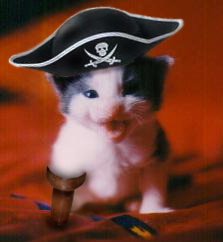Pirates Ain't What They Used to Be!

Arrrrgh! Note to self: Don't bring knife to gunfight.
Pirates attack 2 Navy warships from Norfolk in the Indian Ocean
By STEVE STONE, The Virginian-Pilot
A dozen suspected pirates on a small fishing boat became prisoners Saturday after they opened fire on two Norfolk-based Navy warships in the Indian Ocean.
Five of those captured were wounded and a 13th man was killed, the Navy said.
No one on the Gonzalez, a guided missile destroyer, or the Cape St. George, a guided Updates, photos and video from the Associated Pressmissile cruiser, was hurt.
The incident occurred in international waters, about 25 nautical miles off the central eastern coast of the troubled east African nation.
Why the men opened fire is unclear, but their decision to take on Navy ships in a 30-foot fishing boat was "not too smart at all," said Cmdr. Jeff Breslau, a Fifth Fleet spokesman in Bahrain.
"If somebody shoots at us, they can pretty much expect to die because we will return fire," Breslau said by telephone.
Breslau could recall no other instance in which pirates had fired on Navy ships in that area.
The Gonzalez and the Cape St. George are part of the Navy’s Fifth Fleet, which is based in Bahrain.
On Saturday, they sailed as part of Combined Task Force 150, a maritime coalition task force currently under the command of Commodore Hank Ort of the Royal Netherlands Navy.
Lt. Cmdr. Charles W. Brown, a Fifth Fleet spokesman, said events unfolded shortly after dawn, when the task force spotted the suspicious boat towing two smaller skiffs. It was heading west, toward the coast .
"Their location and their setup mirrored recent pirate procedures, so that made us suspicious and made us want to board them," Breslau said.
The Gonzalez readied a boarding party, and both warships moved to intercept the vessel.
As they approached the smaller boat, Navy personnel "noticed that a group of suspected pirates were brandishing what appeared to be rocket-propelled grenade launchers," Breslau said.
Moments later, the suspected pirates opened fire on the Navy ships.
In response, Brown said, "the Cape St. George and Gonzalez returned fire with small arms in self-defense."
The battle was as brief as it was lopsided.
There were only a few bullet holes on the Navy ships. The attacking vessel was set ablaze, leaving a plume of black smoke rising over the area.
A full assessment of damage to the Navy ships is not expected to be finalized until today, but the crews "did an initial survey of the hulls, and it looked like there was some evidence of small arms fire," Breslau said. "We don't know exactly what hit the ships."
"The ships are definitely unaffected, and they are going to be able to continue their mission without any problem," Breslau said.
The boarding team confiscated an rocket-propelled grenade launcher and automatic weapons from the vessel. Breslau said it was unclear whether the attackers had fired any rockets.
Where the prisoners go next and what ultimately will happen to them was unclear.
For now, those who were not seriously hurt are locked up. The others are under guard while being treated for injuries.
Royal Netherlands Navy medical personnel, including a doctor, from the Dutch fast combat support ship Amsterdam, were sent to help care for the wounded.
It is unclear whether the craft the fishing boat was towing were booty seized earlier. "We don't know whether they stole them from somebody," Breslau said.
In addition to attacking international shipping, pirates have targeted U.N. aid shipments intended to bring relief to the area, which has suffered a severe drought.
Saturday's engagement came three days after the U.N. Security Council encouraged naval forces off Somalia to be vigilant and take action against piracy.
"So, we've been keeping an eye on that while we've been conducting maritime security operations," Breslau said.
Since 1991, Somalia, with a population of more than
8 million, has had no effective central government and has instead been torn by clashes between rival militias.
Piracy has become rampant off the country's coast, and many shipping companies have resorted to paying ransoms to protect their vessels and crews.
Earlier this month, Somali pirates kidnapped 50 Yemeni fishermen, and on Nov. 5, pirates fired rocket-propelled grenades at a 440-foot luxury cruise liner.
No one on the liner was hurt, and the ship sped off before pirates could board.
The last time the Navy was involved in a pirate-related incident was Jan. 21.
The International Maritime Bureau in Kuala Lumpur had reported that pirates had fired on a Bahamian-flagged bulk carrier 200 miles off the coast of Somalia. The crew of the Norfolk-based guided missile destroyer Winston Churchill spotted the suspect vessel and pursued.
A Navy boarding party seized a cache of small arms from the dhow, and 10 suspected pirates were captured. They now are on trial in Kenya.
Task Force 150, which also includes Dutch, German, Pakistani, British and Italian warships, conducts maritime security operations across about 2.4 million square miles in the North Arabian Sea, the Gulf of Oman, the Gulf of Aden and the Red Sea in addition to the Indian Ocean.


1 Comments:
Thanks so much for the post, very helpful info.
ppc service | movers silver spring maryland | promise rings for women
Post a Comment
<< Home